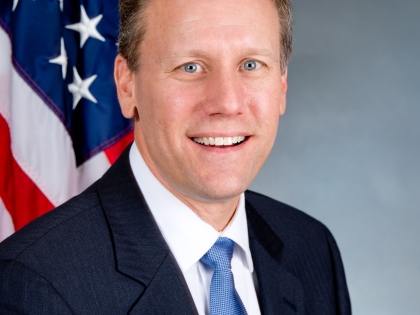
Senator David J. Valesky & IDC Leader Jeff Klein Host Syracuse Round Table on Synthetic Cannabinoids
December 3, 2015

SYRACUSE, N.Y. – State Senator David J. Valesky (D-Oneida) and Independent Democratic Conference Leader Jeff Klein (D-Bronx/Westchester) convened top health, criminal justice and law enforcement officials, on the front lines battling the growing statewide synthetic marijuana epidemic. Also known as K2, spike, or spice, this illicit substance has caused a rise in emergency room visits across New York.
The second in a series of summits, the round table aimed at ensuring that legislative solutions tackle all problems that this unprecedented public health crisis presents to officials grappling with the issue throughout New York State.
The summit, moderated by Senators Valesky and Klein, featured heartbreaking testimony from a mother whose child’s life was taken by synthetic marijuana. The panel featured representatives from the U.S. Drug Enforcement Administration (DEA), the Onondaga County District Attorney's Office, the U.S. Attorney’s Office, Syracuse Police Department, Crouse Hospital, Upstate Hospital, Prevention Network, Syracuse agencies and more.
Panel discussions focused on the scope of the synthetic drug crisis from three perspectives: health and human services, law enforcement, and prosecution. Topics included the depth of the crisis nationwide, disproportionate populations’ use of synthetic cannabinoids and how city, state and federal laws can be enhanced and strengthened to create a coordinated response to synthetic drugs.
“The use and sale of synthetic marijuana in New York state is a serious public health concern that knows no difference between upstate and downstate. From our children being easily targeted through sly, false marketing to our health care providers being forced to quickly find treatment for hundreds of unknown substances in a person using synthetic marijuana – the negative effects are far-reaching in our community and throughout the state,” Senator David Valesky said. “As vice chairman of the Senate Health Committee, I stand ready with my colleagues to provide any and all legislative solutions to address and combat the sale, use and abuse of this highly dangerous drug.”
“From upstate to downstate, this devastating drug is tearing apart families and destroying lives. We must develop coordinated solutions to protect all New Yorkers. I’m proud to stand with Senator Valesky today, to bring together the best and the brightest to combat this dangerous drug in Onondaga County and throughout New York State. I will continue to collaborate with my colleagues in government and fight for the passage of our comprehensive legislation in the state Senate. Together, we can knock out K2,” said Senator Jeff Klein.
This past spring, the Upstate New York Poison Center noted a sharp increase in the number of synthetic marijuana cases reported in Onondaga County, more than in all of the other 53 counties outside of the greater New York City area. Since 2011, synthetic marijuana calls have risen by 540 percent in Onondaga County.
In July, IDC legislation was introduced in the state Senate that would criminalize the sale of K2. The proposed legislation would add “synthetic cannabinoids” to the pre-existing crimes of selling marijuana under New York State’s penal law and provide five degrees of criminal sale – ranging from a class “B” misdemeanor to a class “C” felony – depending on the weight of synthetic cannabinoid sold.
The legislation would also crack down on businesses by increasing penalties for those found selling K2. His legislation would amend the General Business Law to increase fines for businesses found in violation to $2,000 for the first offense, $5,000 for the second offense and the third violation would result in the loss of a store owner’s liquor, tobacco and lottery license.
The IDC also carries legislation that would add an analog statute to the state’s controlled substances law, making any analog of a Controlled 1 or 2 substance illegal. While the state Senate has passed the measure three times, the state Assembly has failed to take action.
Richard S. Hartunian, United States Attorney, Northern District of New York, said: “The proliferation of synthetic cannabinoids presents our communities and law enforcement agencies with new challenges. My office has led the nation in prosecuting traffickers of synthetic drugs and I welcome this discussion at Onondaga Community College as a timely opportunity to share ideas and perspectives.”
Onondaga County Sheriff Gene Conway said: “Synthetic cannabinoids have become a public health and safety problem, which has attributed to the rise in violent crime and emergency room admissions. We continue to warn the public, in hopes of educating them about all synthetic street drugs and the dangerous side effects they possess.”
NYSCOPBA Western Regional Vice President Joe Miano said: “Inmates when they come down from the K2 high they ask 'why am I in the disciplinary unit, why am I in the hospital? The last thing I remember is smoking K2.’”
Dr. Ross Sullivan, director, Medical Toxicology Consultation Service, and assistant professor, Department of Emergency Medicine, Upstate Medical University Hospital, said: “Synthetic cannabinoids are here and they are dangerous. As a society, we need to discuss the dangers of these drugs; these are conversations that not only need to be addressed at forums, but also at the dinner table, from loved one to loved one. It will take all of us to stop this problem.”
Michele Caliva and Gail Banach, Upstate Poison Center, said: “We have seen an increase in synthetic cannabinoids cases. We are grateful that Sen. Valesky and Sen. Klein are responding to this issue. I would like to say that we are three steps ahead of this crisis but in reality we are behind. These drugs are being chemically altered such that new and unanticipated symptoms develop and unsuspecting people find themselves sick and in a health care facility. It is imperative that we come together as a community to respond to this ongoing crisis.”
Beth Hurny, executive director, Prevention Network, said: “Prevention Network commends Sen. Valesky and Sen. Klein for their direct attention to the synthetics epidemic in Onondaga County. Through initiatives such as this round table, the community has an opportunity to be a part of the solution to this public health problem. From the prevention perspective, this type of strategy is exactly what needs to happen!”
Monika Taylor, director of behavioral health services for Crouse Hospital, said: “Crouse Hospital has been providing substance abuse treatment services for the Central New York community for over 50 years. We applaud Senators Valesky and Klein for their commitment to not only increasing awareness of the issue of substance abuse and addiction in our communities, but also for encouraging dialogue and solutions to help address this important topic.”
Lawrence Williams, program director, Syracuse Save Our Youth, Syracuse Model Neighborhood Facility, Inc., said: “As there has been a rise in the use of the synthetic drug use culture in our city, so too have we seen the direct effects of its usage in our gang and gun violence efforts. We believe that some of the increase in gun and gang violence is because young men in particular are involved in some of the violent acts as a result of the inhibitions due to synthetic drug use.”-more-
Michael W. La Flair, executive director, Northeast Hawley Development Agency, said: “Synthetic marijuana has become one of the top challenges our urban centers face in addition to so many others today. In the first six months of 2015, Onondaga County accounted for 62% of calls received in regards to synthetic marijuana by the Upstate New York Poison Control Center. In addition to the physical and medical issues, ‘spike’ also threatens the fabric of our neighborhoods with an increase in crime and gang related activity. We must work comprehensively from a local and state level if we want to ensure sustainable measures are in place to combat this menace.”
Michael Collins, executive director, Syracuse Northeast Community Center, said: “The city of Syracuse has become ground zero in the synthetic marijuana epidemic. The use of this dangerous drug has severely impacted our area residents and the quality of life in our neighborhoods. In the past year the city of Syracuse Police Department and the Onondaga County District Attorney’s office announced efforts to work jointly to combat this growing problem. In order to succeed as a community other stakeholders need to be part of the solution. Our neighborhoods deserve a fighting chance.”
Andrew Felter, RPh., Pharmacy Operations, Wegmans Food Markets, Inc., said: “A disturbing truth is that the wrongful use of drugs impacts our entire community, transcending all social, economic and ethnic boundaries. We must be prepared to meet the challenges of this growing epidemic of synthetic drugs facing our communities. Having all stakeholders collaborating on this effort is integral to developing a community-wide response. Whether we are parents, community leaders, healthcare professionals, elected officials, law enforcement or members of the business community, we all have a stake in eradicating this epidemic. Wegmans will do all we can to assist in this effort.”
Deirdre Canaday, anti-synthetic drug activist and mother whose son passed away from K2 use, said: “As a parent who lost her only son in the prime of his life to a synthetic cannabinoid product, it has been an honor to attend and speak at the Syracuse, Bronx, and Brooklyn Summits. Synthetic drugs are fast becoming the ‘wave of the future,’ affecting our most vulnerable populations. I am here to fully support both Senator Klein and Valesky's proposed legislation. It should be a crime for people to knowingly place a proven poisonous product in colorfully packaged products, be it solid or liquid form, and profit from the death and misery of others. I can only hope and pray that all of our New York legislators, both Senate and Assembly alike, will have the wisdom and foresight to pass these protective measures into law. It would be the crowning moment of my life to stand next to the governor of New York State and watch this legislation be signed into law.”
Teresa F. Woolson, mother whose son passed away from K2 use, said: “There is a new type of drug dealer – the entrepreneur – destroying lives and communities. There must be appropriate consequences for the manufacturers, distributors and store owners profiting from these poisons. Bans are not an effective deterrent. The death of my son has devastated our family and entire community. Now is the time for passage of synthetic drug legislation to help end this deadly poison from destroying more lives.”
related legislation
Share this Article or Press Release
Newsroom
Go to Newsroom
Senator Valesky to Hold Free Senior Fair on October 14 in Madison County
September 28, 2015